Related Articles
00 / 00

Request an Appointment
Director, Fox Chase Cancer Center Buckingham
Associate Professor, Department of Radiation Oncology
Prostate Cancer, Cervical Cancer, Ovarian & Primary Peritoneal Cancer, Breast Cancer, Lung Cancer, Vulvar Cancer, Endometrial (Uterine) Cancer
CyberKnife training; Lung Cancer; Breast Cancer; gynecological cancers; CNS malignancies; IMRT; stereotactic body radiation and stereotactic radiosurgery
I would like to give you a little background about myself, my training and my approach to treating cancer patients.
I did my undergraduate work at the University of Pennsylvania, majoring in bioengineering. I attended medical school at Temple University and did my residency in radiation oncology at the Fox Chase Cancer Center where I served as chief resident in 2005-06. During my training, I participated in many clinical research projects which have been published in various peer reviewed journals and presented at our national meeting of radiation oncologists. My research endeavors earned me the RSNA Roentgen Resident/Fellow Research Award in 2006.
Upon finishing my residency, I entered private practice, joining a radiation oncology group in Richmond, VA where I spent two years. During that time, I attended training in Pittsburgh, PA, becoming certified on the gamma knife, a radiosurgery treatment unit to treat benign and malignant tumors and other conditions in the brain. While practicing in Richmond, I worked in conjunction with a large neurosurgery group and treated many types of central nervous system tumors. I became board-certified in radiation oncology in 2008. I am now returning to Fox Chase as the Director of the Fox Chase Cancer Center- Buckingham radiation facility in Bucks County... Expand
I am excited to be part of the Fox Chase family once again. I chose to return to Fox Chase because of the outstanding care we provide. Not only do we offer treatments with the latest, most cutting edge technology, but we do so in an evidence-based manner. We enroll patients on clinical trials, both Fox Chase trials and cooperative group trials, in order to scientifically analyze the most effective treatments. We maintain databases for various disease sites so as to critically analyze our results and make changes in treatment regimens to continually improve our outcomes.
I treat all types of cancer, but have a particular interest in breast, gynecologic, prostate and lung malignancies. I also have an interest in brain and spinal cord tumors. I have experience in using intensity modulated radiation therapy, image-guided radiation therapy, stereotactic radiosurgery and stereotactic body radiotherapy to treat many different cancers.
My personal philosophy with regards to treating cancer is a patient focused approach. I believe that each patient has a unique set of needs and concerns. I will create an individualized treatment plan to meet those needs. I will work in conjunction with your other physicians to coordinate and streamline your care. Collapse

My name is Edward Enoch, and I am from Lansdale, Pennsylvania. I was sixty years old and two years retired when my life took a startling turn.
Like millions of other retirees, my wife Janice and I were updating our health insurance. We met with an agent who asked that I schedule a routine checkup. I thought nothing of it at the time—after all, I had no complaints about my health. However, once I received the results of my blood test, the confidence I had regarding my health started to waver.

I remember the day I was diagnosed so clearly. December 16, 2009.

After a triple negative breast cancer diagnosis, Diane Check sought treatment at Fox Chase Cancer Center. With the help of Dr. Marcia Boraas of Fox Chase and Dr. Shelly Hayes of Fox Chase Cancer Center Buckingham, Diane beat breast cancer through chemotherapy and a double mastectomy.
I am interested in the effects of respiration on tumor motion in the lung, breast, and abdomen and in utilizing image-guidance to improve the accuracy and efficacy of radiation to these areas. I have also studied parameters for treatment decisions for salvage radiation after prostatectomy for recurrent prostate cancer and the risk of lymphedema in breast cancer patients treated with radiation after lumpectomy.
Fareed MM, Eldib AA, Weiss SE, Hayes SB, Li J, Ma CC. A treatment planning comparison between a novel rotating gamma system and robotic linear accelerator based intracranial stereotactic radiosurgery/radiotherapy. Physics in medicine and biology, 63(3):035029, 2018. PubMed
Esposito AC, Crawford J, Sigurdson ER, Handorf EA, Hayes SB, Boraas M, Bleicher RJ. Omission of radiotherapy after breast conservation surgery in the postneoadjuvant setting. Journal of Surgical Research, 221:49-57, 2018. PMC5729922
Lu Wang, Shelly Hayes, Kamen Paskalev, Lihui Jin, Mark K. Buyyounouski, Charlie C.-M. Ma, Steven Feigenberg. "Dosimetric comparison of stereotactic body radiotherapy using 4D CT and multiphase CT images for treatment planning of lung cancer: evaluation of the impact on daily dose coverage." Radiotherapy and Oncology 2009. Article in Press.
Shelly B. Hayes, MD, Gary M. Freedman, MD, Tianyu Li, Penny R. Anderson, MD, Eric Ross. “Does Axillary Boost Increase Lymphedema Compared with Supraclavicular Radiation Alone After Breast Conservation?” International Journal of Radiation Oncology, Biology and Physics, Vol. 72(5), 2008, p1449-55.
Shelly B. Hayes, MD, Yan Chen PhD, Tianyu Li, Gary M. Freedman MD, “An Analysis of Breast Motion due to Respiration using 4D CT simulation.” ASTRO 2007 Poster Presentation.
Pollack A, Hayes S, Roach M III, Merrick G, Anscher MS, Beyer DC, Lawton CA, Lee WR, Michalski JM, Rosenthal SA, Vijayakumar S, Carroll PR, Higano CS, Expert Panel on Radiation Oncology-Prostate. Postradical prostatectomy irradiation in prostate cancer. online publication. Reston (VA): American College of Radiology (ACR); 2006. 18 p. [116 references].
Shelly B. Hayes, MD; Alan Pollack, MD, PhD. “Parameters for Treatment Decisions for Salvage Radiation Therapy.” JCO Nov 10 2005; Vol 23(32);8204-11.
Shelly B. Hayes, MD, Gary M. Freedman, MD, Tianyu Li, Eric Ross, Penny R. Anderson, MD, Andre Konski, MD, MBA. “An Analysis of Outcome Based on Marital Status in Early Stage Breast Cancer Patients Undergoing Breast Conservation Therapy.” ASTRO 2005 abstract.
Shelly B. Hayes, MD; Alexandra L. Hanlon, PhD; Eric M. Horwitz, MD; Alan Pollack, MD, PhD; Robert G. Uzzo, MD; and, Steven J. Feigenberg, MD. “Are there any prostate cancer patients without high risk features who need long term androgen deprivation with external beam radiation therapy? A recursive partitioning analysis.” ASTRO 2004 abstract.
The following ratings and reviews are based on verified feedback collected from independently administered patient experience surveys. The ratings and comments submitted by patients reflect their own views and opinions. Patient identities are withheld to ensure confidentiality and privacy. Learn more about our Patient Experience Ratings.
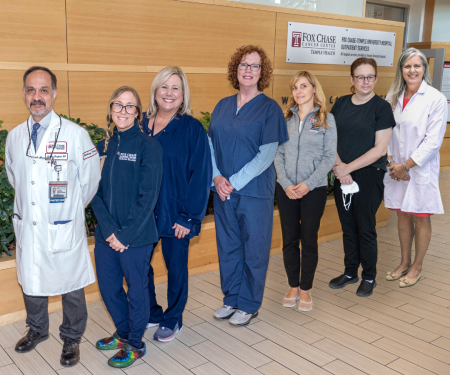


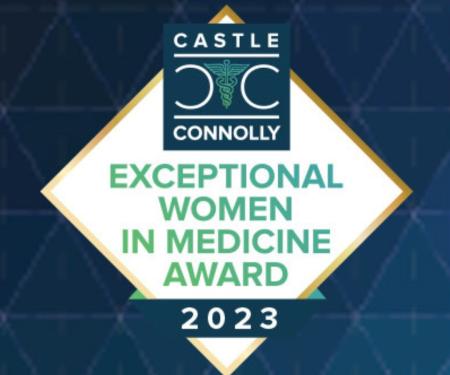
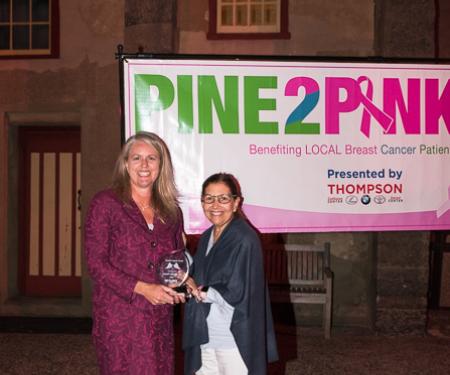


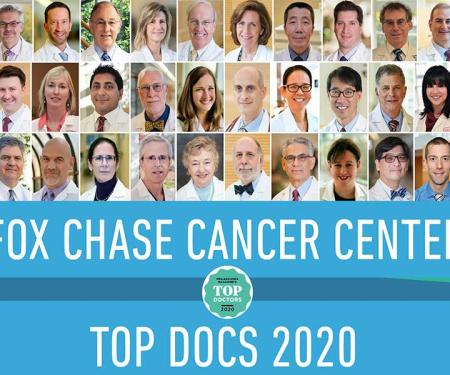
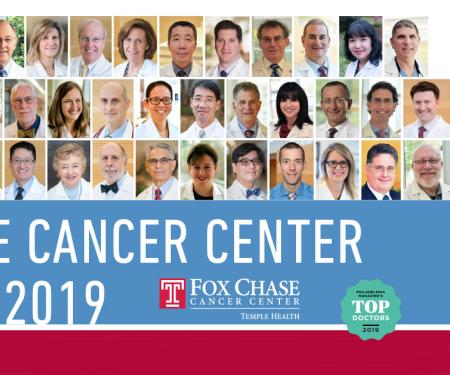


Patient comments
Dr. Hayes and the staff treated me Like they cared about my health.
Dr Hayes is top notch
Very thankful for fox chase cancer care and dr Hayes as well as her team. Great place. Great people
Always receive excellent care. Dr and nurses always listen and give excellent feedback giving me confidence
Dr Hayes was outstanding